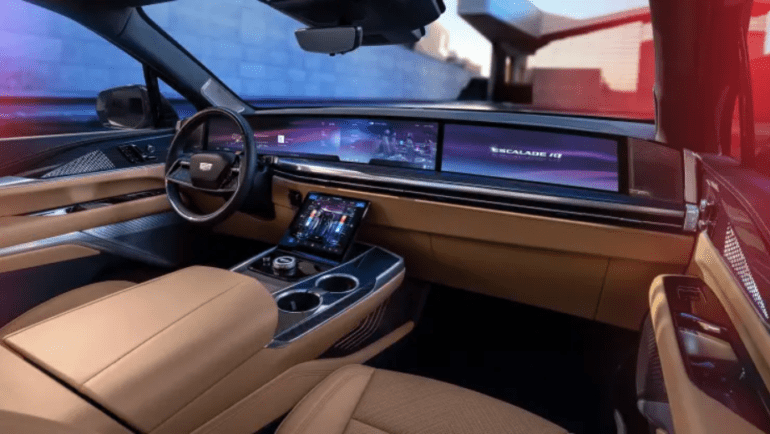TL;DR:
- Qualcomm, known for smartphone chips, is expanding into automotive market with Snapdragon Digital Chassis.
- AI integration to drive chip sales, enabling smart assistants for drivers.
- Modest revenue from cars, but strong projection of $9 billion by 2031.
- Qualcomm chips empower GM’s high-end SUV, showcasing integration.
- Intense competition with Intel, Nvidia, and traditional suppliers in the car chip industry.
- Demonstrates AI-driven scenarios for cars, enhancing user experience.
- CEO sees cars as new computing platforms, emphasizing AI push.
- Plans for AI-based user guides and driver monitoring systems.
- Envisioning upgradable features via over-the-air software updates.
Main AI News:
When you think of Qualcomm, the first thing that comes to mind might be the chips and modems nestled within Android smartphones. Yet, the company has embarked on a remarkable journey in recent times, diversifying its offerings beyond handheld devices. Snapdragon Digital Chassis, a comprehensive suite encompassing hardware chips, sensors, and cutting-edge software, has found its way into the hands of esteemed automakers like GM, Hyundai, and Volvo.
Leveraging the Momentum of Generative AI
Qualcomm has set its sights on harnessing the burgeoning excitement around generative artificial intelligence, a technology with transformative potential. This strategic move aims to not only boost chip sales but also to catalyze the development of novel applications in collaboration with automakers. Imagine intelligent assistants guiding drivers through urban labyrinths, managing reservations seamlessly, and tackling daily computational tasks with flair.
In the grand scheme of Qualcomm’s revenue landscape, the automotive segment still occupies a relatively modest space. To put things in perspective, the fiscal year 2022 saw $1.32 billion in automotive sales, constituting a mere 3% of the company’s overall revenue. However, the vision extends far beyond the horizon. Qualcomm anticipates that its chips will become an integral facet of forthcoming automobile models in the next few years, paving the way for an ambitious projection of over $9 billion in sales by 2031.
The Business Dynamics
Every car integrated with Qualcomm’s chips and software translates into a potential income stream, ranging from $200 to $3,000 per vehicle, according to insights shared by officials at a past investor event. In the interconnected world of 5G, Qualcomm secures a $5 cut for each car linked to this advanced network via licensing fees.
The Cadillac Escalade IQ SUV, priced at $130,000, serves as a tangible testament to Qualcomm’s influence in the automotive realm. Powering the SUV’s immersive 55-inch dashboard display, along with features like lane-keeping and hands-free driving under GM’s “Ultra Cruise” brand, lies Qualcomm’s technology. Interestingly, the SUV forgoes the ubiquitous phone mirroring functionality, spotlighting GM’s bespoke software interface. This shift magnifies the pivotal role played by in-car computing experiences.
Navigating Competitive Currents
The automotive chip market witnesses fierce rivalry, with other chipmakers vying for a slice of the pie. Giants like Intel, courtesy of its Mobileye subsidiary, and Nvidia join the fray, accompanied by conventional auto suppliers such as Continental, NXP Semiconductors, and Bosch. All contenders clamor to equip vehicles with dashboard components and driver assistance systems, prompting Qualcomm to strategize and innovate diligently.
A Glimpse into the AI-Infused Future
Qualcomm recently unveiled glimpses of prospective scenarios unlocked by its chips, driven by the prowess of large language models and generative AI. Envision a car assistant curating a recipe for delectable chicken enchiladas and subsequently populating a shopping list. Or visualize the car’s onboard computer, powered by the ingenious Stable Diffusion generative AI model, crafting and dispatching an AI-generated birthday card to the driver’s sibling. Notably, these demonstrations unfolded within the car’s computational hub, rather than relying on external devices.
An Epiphany: Cars as a “New Computing Platform”
Cristiano Amon, Qualcomm’s visionary CEO, envisions cars as a novel computing paradigm. In a recent blog post, he outlined his perspective, underscoring the forthcoming evolution of cars into personal computers. This transformation aligns seamlessly with Qualcomm’s overarching strategy to establish itself as a prominent AI entity, boasting energy-efficient smartphone GPUs and AI accelerators.
A Gaze Toward the Horizon
Qualcomm’s aspirations extend to crafting a smart user guide using a language model trained on intricate car manuals, a goal voiced by Nakul Duggal, the company’s Automotive Senior Vice President. The frontier of driver monitoring beckons, where machine learning might discern driver distraction or drowsiness, enhancing road safety.
Unleashing Upgradable Features on the Move
Qualcomm envisions an innovative trajectory, wherein its platform delivers real-time software enhancements, augmenting a vehicle’s self-driving capabilities. This innovative concept opens doors to novel revenue streams for automakers. Picture this: over-the-air upgrades ushering in automated parking features or enthralling free trial periods, transforming the very landscape of driving experiences.
Conclusion:
Qualcomm’s strategic focus on AI-infused solutions for the automotive sector positions the company for transformative growth. By leveraging AI capabilities, Qualcomm aims to elevate driving experiences, establish itself as an AI leader, and tap into the burgeoning market for intelligent automotive technologies. This move not only solidifies Qualcomm’s foothold in the industry but also signals a paradigm shift toward AI-driven innovation in the automotive market.

